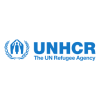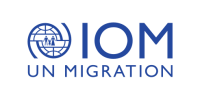Governance, Rule of Law, and Human Rights
Alignment with SDGs

A series of life cycle memoirs of Albanian migrants
The stories of Albanians in migration are different. The circumstances they left the country, the obstacles, and challenges they went through, or the difficulties they encountered make each story unique.
But many of them have the same message – to be informed about safe and regular migration. From a young age, chef Alfred Marku from Lezha dreamed of a better life, which Albania of early 90’ could not offer him. After a period of migration to Italy he returned to his hometown where he opened his own restaurant. Today he is 43 years old and one of the most successful chefs in Albania. Chef Alfred has tried both sides of the coin and in the end, he found the best in his country. His message in this migration testimony is addressed to all Albanians advising them not to flee their country because Albania cannot be developed by itself.

Read the original story here.
Access to Justice
The UN supported the government in improving and implementing the justice system substantive and procedural framework and increasing capacities of state structures on provision and monitoring of the service. The assessment of the national Justice for Children Strategy (2018–2021) was completed, and the new Strategy 2022–2026 was adopted by the Council of Ministers, thereby leading the country beyond the concept of criminal justice for children towards children’s equitable access to justice in other areas of justice, namely family, civil and administrative. More than 475 justice system professionals, social services staff and labour dispute mediators and conciliators had capacities strengthened in confirming nationality of persons otherwise at risk of statelessness, the Criminal Justice for Children Code, integrated Justice for Children (J4C) Data System use, referral and management of cases of children in conflict and in contact with the law, domestic violence, trafficking in persons, women’s access to justice needs, women’s property rights in reconstruction processes in earthquake-affected areas, anti-discrimination, international labour standards, peaceful labour dispute resolution, public mediation and conciliation procedures, and pension-related topics.
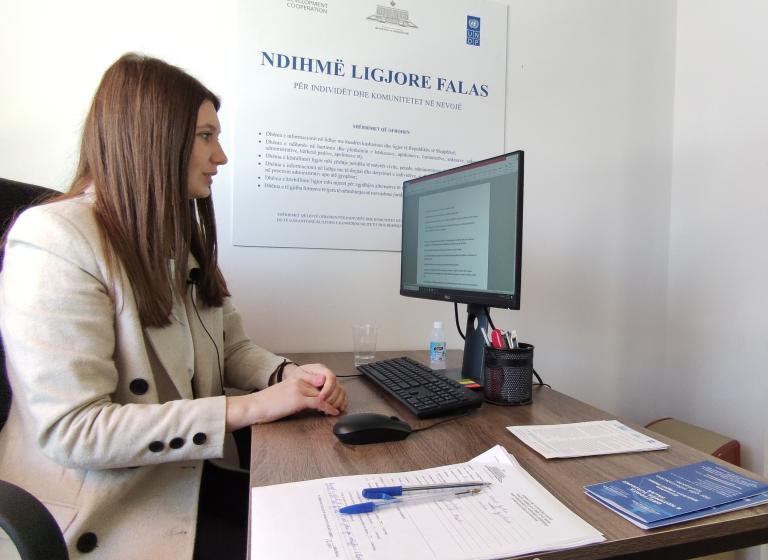
Some 2,300 citizens benefited from Free Legal Aid (FLA) centres in Berat, Diber, Durres, Elbasan, Fier, Gjirokaster, Lezhe, Pogradec, Shkoder and Vlore, and 1,615 in-need citizens and 500 women survivors of violence benefited from both primary and secondary legal aid from CSOs supported by the UN in 24 municipalities. In 2022, three new FLA centres were opened, in Berat, Elbasan and Kukes, increasing to eleven the number of such centres opened with UN support. A total of 3,430 in-need individuals in 24 municipalities were legally empowered on access to justice, human rights and legal aid provided by the state through information sessions, street law activities and community meetings.
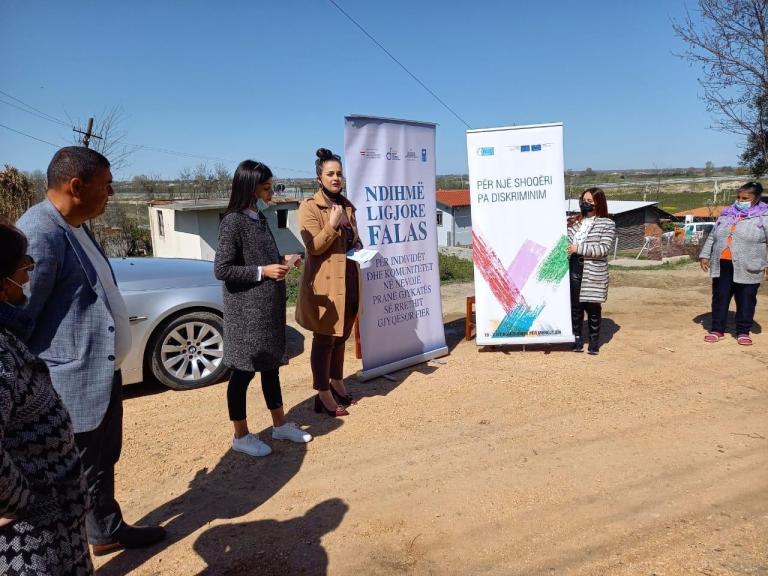
With UN advocacy and support fourteen leaders from public authorities representing the justice and care sides of legal processes affecting children concluded Memoranda of Understanding and Cooperation in Puke and Shkoder. As a result, 481 children (287 females) and 141 youth (71 females) took active part in education and community awareness activities to promote child-friendly justice, while 150 students, 30 teachers and security officials were trained in conflict resolution methods. In addition, 200 parents (173 females) engaged in positive parenting programmes with a strong gender equality focus, 140 (72 females) children and youth in conflict or contact with the law were referred to and obtained integrated services, including restorative justice and mediation services, mentoring and job placement, socio-economic (re)integration support, with legal and psychological assistance provided for legal processes in which they were involved. The J4C data system recorded more than 200 justice professional users with approximately 2,000 children’s cases logged. Law students from Aleksander Xhuvani University in Elbasan were equipped with the tools and knowledge to provide free legal aid and information to over 100 women in rural communities around Elbasan region.
Good Governance, Participation and Voice
The UN continued to strengthen participatory democracies and supported the EU integration process of Albania by empowering civil society and youth to actively participate in decision making by creating an enabling legal and financial environment for them. By the end of the year, the capacity of local governments and CSOs was strengthened to institutionalize and implement transparent and gender-responsive grant schemes, benefiting more than 50 local government professionals and 29 CSOs, and to generate greater civic and youth engagement in local affairs. In addition, the Minister of State for Youth and Children adopted the methodology of the Local Democracy Strengthening Project (LOD, 2009-2016) and as a result a new legal act was revised for the grant scheme to improve financial mechanisms used for the disbursement of public funds to CSOs. A national public call for CSOs, launched by the National Youth Agency, was implemented following LOD principles and rules for a more transparent mechanism in support of the youth sector in Albania. The second National Action Plan on implementation of UN Security Council Resolution 1325 on Women, Peace and Security is being prepared in consultation with civil society actors promoting the Women, Peace and Security agenda.
Data and Evidence
Key challenges on the adequacy of financing and systemic weaknesses in collecting and analysing statistical data in Albania were addressed by the UN through several initiatives undertaken in 2022. For example, the Labour Market Information Observatory was developed as a tool to enhance evidence-based policy making in the skills development and employment sector, featuring four main features: Data, Themes, Explore and Reports. MoFE is considering taking full ownership of the platform (named the Economic Development Tracker), rolling it out to other sectors and making it the primary mechanism for fetching, analysing and disseminating information and intelligence on various sectors. A dedicated Policy Research Unit (PRU) was established in MoFE to monitor macro-economic developments and trends and to provide actionable policy recommendations. INSTAT drafted an assessment of the labour market needs in selected countries of destination and their impact on the Albanian labour force, and how labour migration from and to Albania has been affected by Covid-19. A study was carried out into the impact of migration on the structure of the labour force, complemented by population projections and leading to recommendations on skills development, including from the gender perspective. Capacity building on migration data, with specific focus on labour migration, was carried out, in cooperation with the Albanian School of Public Administration (ASPA). Government is drafting an analytical report for the 2nd Gender Equality Index for Albania, increasing availability of comparable evidence and data on GE in Albania. The Ministry of Culture completed data collection and construction of culture development indicators and finalized a technical report enabling comparison with data, results and sectoral policy in other SEE countries and at the EU level. MoARD and INSTAT initiated joint work on elaboration of missing SDG indicators in the National Strategy for Agriculture, Rural Development and Fisheries and their monitoring. Additionally, recommendations were provided for formalization of the institutional focal points and adoption of the WB-MIDEX platform for facilitation of the migration data exchange.
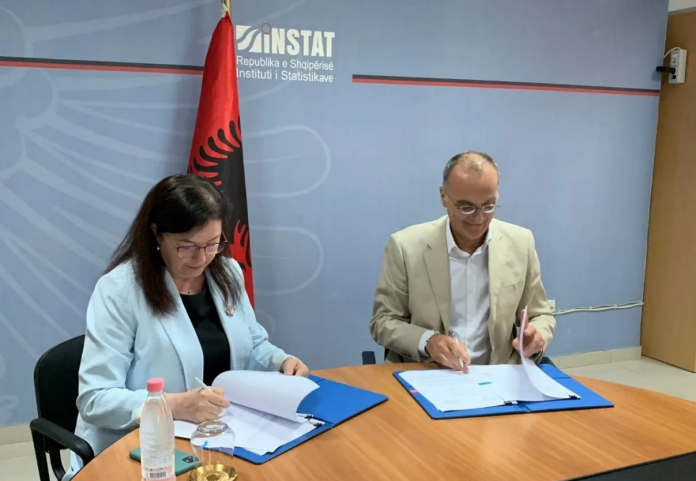
Public Sector Accountability and Quality Services
Improved access to public services and the quality and efficiency of their delivery to citizens and businesses was evidenced in 2022 through contributing to the establishment of digital public services national standard requirements that adhere to the best EU and international practices, supporting the transformation to e-Services and promoting the expansion of citizen-centric public service delivery based on customer-care principles. At the central level, UN partnered with the government institutions responsible for standards of service and the digital agenda and aided in policy design, institutional capacity development, and improved access and accessibility. By the end of 2022, the new national Decentralization Strategy 2023–2030 was drafted and is currently undergoing the final consultations. The 2021 annual Trust in Governance (TiG) Opinion Poll was completed, capturing public perceptions and attitudes on the trustworthiness of institutions, transparency and accountability, corruption, political influence, citizen engagement, satisfaction with public service delivery and gender and social inclusion. The fieldwork for the 2022 edition was carried out during November and December 2022 across the 61 municipalities of Albania with a nationally representative sample of 2,500 respondents, controlled for gender. At the local level, the focus was placed on consolidating and expanding the municipal one-stop-shop system, established and made operational through UNDP’s STAR2 project, in 52 Albanian municipalities while its rollout to the planned 250 administrative units (AUs) was suspended as requested by government due to changing priorities shifting from desk to e-Services. Instead, the design of an exercise for assessing the digital readiness of local governments and citizens started, with plans to implement the exercise in the field in 2023. Integrity plans were expanded to 15 additional municipalities and five line ministries as a preventive measure tackling the risk of corruption within public institutions and expanding the experience of municipal integrity planning from a pilot scale previously to about one-third of Albania’s municipalities. The customer care principles expanded with delivery of public services for citizens and businesses in Permet Municipality, bringing to fourteen the total number of benefiting small and medium-size municipalities.
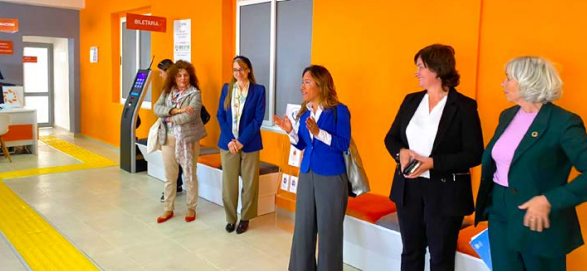
Accountability and Oversight for Human Rights
The UN employed its advocacy and convening role with Parliament, national human rights institutions (NHRIs) and political parties around child rights, GE, non-discrimination, eradication of gender-based violence (GBV) and harmful practices and invested in strengthening the capacities of the public oversight mechanisms in monitoring and generating evidence on the situation and violations of vulnerable groups. The People’s Advocate is developing a new case management system to cope with the workload and reporting and enable the institution to link its work with human rights SDG indicators, expected to be finalized in early 2023. It also developed a Child Rights Impact Assessment Report related to the Covid-19 response. The Ombudsman issued several recommendations to public authorities for the protection of children in the earthquake-affected areas.
In its special role as an NHRI, it monitored and protected human rights of refugees and migrants at the border. The Group of Parliamentarians ‘Friends of Children’ developed a yearly action plan for advancing child rights and used international and national events and forums to raise challenges and share solutions for advancement of child rights. The group also organised two hearings to examine and call on the government to step up efforts in addressing legal and implementation gaps in response to the issue of foreign unaccompanied children in Albania, as well as for ensuring the child’s right to friendly and accessible justice that provides remedies to violations of child rights. MPs conducted site visits and held dialogue with adolescent boys and girls in their constituencies. Efforts were made to establish an All-Party Parliamentary Group on the Population, whose formal launching will be in 2023. An MoU with the Commissioner for Anti-Discrimination was signed with the main focus on raising awareness on the anti-discrimination law among employees in the private sector. The Human Rights Academy brought together in its 11th year 25 young people from various minority groups.
Migration and Asylum
Since the beginning of 2018, Albania has been a transit route for refugees and migrants traveling as part of a mix of movements towards the EU. By end-2022, the government was being supported to enhance the processing of refugees and migrants as part of mixed movements through the expansion of current reception capacities, to better address vulnerabilities. Government was also supported for the coordination and monitoring of the National Strategy on Migration (NSM) and Action Plan (AP) 2019–2022, with implementation and mid-term review of the NSM and AP conducted. Country-wide awareness-raising campaigns were conducted on prevention of irregular outmigration. The UN advocated to Parliament the issue of non-national unaccompanied and separated children (UASC) and presented recommendations to improve UASC legislation, while SACRP was presented with best EU practices on assessment and determination of the best interests of such children. MoARD designed a participatory people-focused local development strategy and two by-laws on registration to support LAGs in rural areas that include female returnees who want to contribute to the community for effective protection and integration. The border authorities were sensitized to international protection and supported in identifying and referring asylum seekers and persons with specific needs. The capacities of the national asylum authority was strengthened with regard to applications for refugee family reunification, while strengthened and more coordinated case handling was ensured, credited to regular stakeholder meetings.
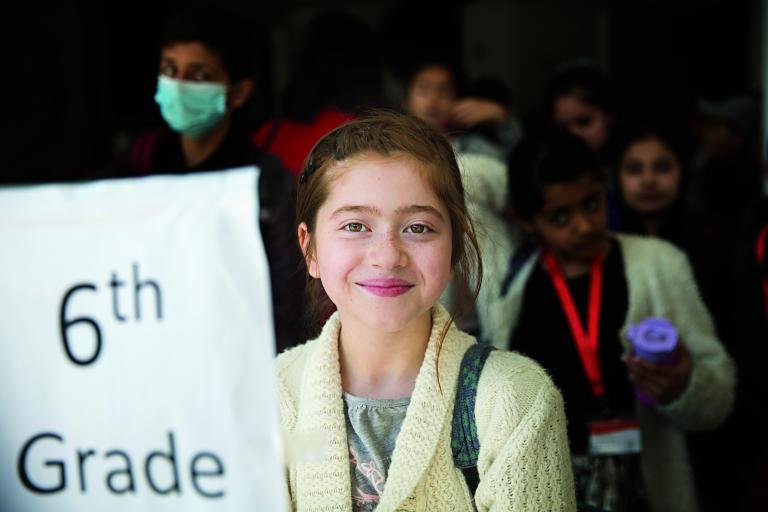
Results in Numbers
In-need individuals
in 24 municipalities were legally empowered on access to justice, human rights and legal aid provided by the state.
Youth
across the country trained on how to address peacebuilding and hate speech issue.
Refugees and migrants
including women, children and adolescents, were assisted in the reception centre with psycho-social and medical services, recreational and sport activities in child-friendly spaces, personal and environmental hygiene, family planning, gender-responsive services (provided by 2 female staff, focusing on potential victims of domestic and sexual violence).
Youths
across the country were trained in how to address peacebuilding and hate speech issues, using peer-to-peer training approach, by a Y-Peer network of trainers.
Citizens
benefited from Free Legal Aid (FLA) centres in Berat, Diber, Durres, Elbasan, Fier, Gjirokaster, Lezhe, Pogradec, Shkoder and Vlore, and 1,615 in-need citizens and 500 women survivors of violence benefited from both primary and secondary legal aid from CSOs supported by the UN in 24 municipalities.




